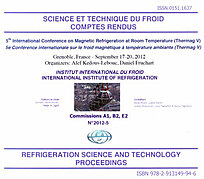
Document IIF
Comparaison des conversions de l'énergie électrocalorique et magnétocalorique.
The electrocaloric versus magnetocaloric energy conversion.
Numéro : sect. 3
Auteurs : OZBOLT M., KITANOVSKI A., TUSEK J., et al.
Résumé
One of the main alternatives to conventional compressor refrigeration technologies is the magnetic refrigeration. Despite of the large potential, some important obstacles, which regard the power density, as well as the cost and the efficiency, must be solved in future. Another alternative, with no so advanced research activities, but with the very high potential, is the electrocaloric refrigeration. Until recently, the electrocaloric materials did not show so promising characteristics as these may be found at present. Today, scientists are working to synthesize promising dielectric materials which have a potential to be applied in market applications of this technology. A number of different electrocaloric materials exist today. These can be, similar as in the magnetocalorics, layered, in order to increase the temperature span. This paper gives a brief review on the electrocaloric materials. A comparison between the electrocaloric and magnetocaloric regenerators has been performed and the results are presented in the paper. Further discussion is given on the future view of developments in the electrocaloric energy conversion.
Documents disponibles
Format PDF
Pages : 397-404
Disponible
Prix public
20 €
Prix membre*
Gratuit
* meilleur tarif applicable selon le type d'adhésion (voir le détail des avantages des adhésions individuelles et collectives)
Détails
- Titre original : The electrocaloric versus magnetocaloric energy conversion.
- Identifiant de la fiche : 30005586
- Langues : Anglais
- Source : 5th International Conference on Magnetic Refrigeration at Room Temperature (Thermag V). Proceedings: Grenoble, France, September 17-20, 2012.
- Date d'édition : 17/09/2012
Liens
Voir d'autres communications du même compte rendu (70)
Voir le compte rendu de la conférence
-
Principles of solid-state cooler on layered mul...
- Auteurs : STARKOV A., PAKHOMOV O., STARKOV I., et al.
- Date : 17/09/2012
- Langues : Anglais
- Source : 5th International Conference on Magnetic Refrigeration at Room Temperature (Thermag V). Proceedings: Grenoble, France, September 17-20, 2012.
- Formats : PDF
Voir la fiche
-
An experimental comparison of four regenerators...
- Auteurs : LEGAIT U., GUILLOU F., KEDOUS-LEBOUC A., et al.
- Date : 17/09/2012
- Langues : Anglais
- Source : 5th International Conference on Magnetic Refrigeration at Room Temperature (Thermag V). Proceedings: Grenoble, France, September 17-20, 2012.
- Formats : PDF
Voir la fiche
-
Simulations and design of a refrigerating devic...
- Auteurs : FARINA A., RIABOVA K., BENNATI C.
- Date : 16/09/2018
- Langues : Anglais
- Source : 8th International Conference on Caloric Cooling (Thermag VIII). Proceedings: Darmstadt, Germany, September 16-20, 2018.
- Formats : PDF
Voir la fiche
-
Thermal imaging of active magnetic regenerator ...
- Auteurs : SHASSERE B., ABDELAZIZ O., EVANS B., et al.
- Date : 17/09/2012
- Langues : Anglais
- Source : 5th International Conference on Magnetic Refrigeration at Room Temperature (Thermag V). Proceedings: Grenoble, France, September 17-20, 2012.
- Formats : PDF
Voir la fiche
-
Design of an improved reciprocal room-temperatu...
- Auteurs : JIN P. Y., HUANG J. H., YAN H. W., et al.
- Date : 17/09/2012
- Langues : Anglais
- Source : 5th International Conference on Magnetic Refrigeration at Room Temperature (Thermag V). Proceedings: Grenoble, France, September 17-20, 2012.
- Formats : PDF
Voir la fiche
